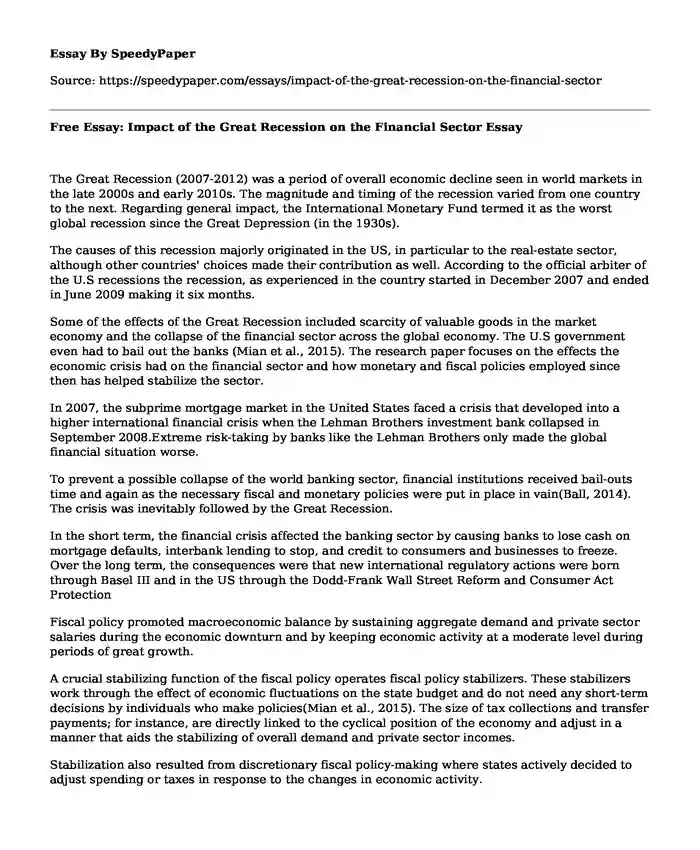The Great Recession (2007-2012) was a period of overall economic decline seen in world markets in the late 2000s and early 2010s. The magnitude and timing of the recession varied from one country to the next. Regarding general impact, the International Monetary Fund termed it as the worst global recession since the Great Depression (in the 1930s).
The causes of this recession majorly originated in the US, in particular to the real-estate sector, although other countries' choices made their contribution as well. According to the official arbiter of the U.S recessions the recession, as experienced in the country started in December 2007 and ended in June 2009 making it six months.
Some of the effects of the Great Recession included scarcity of valuable goods in the market economy and the collapse of the financial sector across the global economy. The U.S government even had to bail out the banks (Mian et al., 2015). The research paper focuses on the effects the economic crisis had on the financial sector and how monetary and fiscal policies employed since then has helped stabilize the sector.
In 2007, the subprime mortgage market in the United States faced a crisis that developed into a higher international financial crisis when the Lehman Brothers investment bank collapsed in September 2008.Extreme risk-taking by banks like the Lehman Brothers only made the global financial situation worse.
To prevent a possible collapse of the world banking sector, financial institutions received bail-outs time and again as the necessary fiscal and monetary policies were put in place in vain(Ball, 2014). The crisis was inevitably followed by the Great Recession.
In the short term, the financial crisis affected the banking sector by causing banks to lose cash on mortgage defaults, interbank lending to stop, and credit to consumers and businesses to freeze. Over the long term, the consequences were that new international regulatory actions were born through Basel III and in the US through the Dodd-Frank Wall Street Reform and Consumer Act Protection
Fiscal policy promoted macroeconomic balance by sustaining aggregate demand and private sector salaries during the economic downturn and by keeping economic activity at a moderate level during periods of great growth.
A crucial stabilizing function of the fiscal policy operates fiscal policy stabilizers. These stabilizers work through the effect of economic fluctuations on the state budget and do not need any short-term decisions by individuals who make policies(Mian et al., 2015). The size of tax collections and transfer payments; for instance, are directly linked to the cyclical position of the economy and adjust in a manner that aids the stabilizing of overall demand and private sector incomes.
Stabilization also resulted from discretionary fiscal policy-making where states actively decided to adjust spending or taxes in response to the changes in economic activity.
Monetary policy stabilizes the economy by adjusting the supply of money in the economy to achieve some combination of inflation and output stabilization. It was a meaningful policy tool because in the short run prices and wages do not adjust immediately, changes in the supply of money can influence the actual production of goods and services. During the recession, consumers stopped spending as much money as they used to, business production reduced which led firms to lay off workers and halt investing in the new workforce(Ball, 2014).
In summary, there was a decline in general or aggregate demand to which the government responded by using a policy that leaned against the direction in which the company was headed.
To conclude, it is clear that the Great Recession hit the economy hard. It affected all the sectors of the economy especially the banking system. With the employment of the fiscal and monetary policies among others; however, it has been able to recover, and great improvement has been seen from that time to date.
References
Ball, L. M. (2014). Long-term damage from the Great Recession in OECD countries (No. w20185). National Bureau of Economic Research.
Mian, A., & Sufi, A. (2015). House of debt: How they (and you) caused the Great Recession, and how we can prevent it from happening again. University of Chicago Press.
Cite this page
Free Essay: Impact of the Great Recession on the Financial Sector. (2022, Mar 01). Retrieved from https://speedypaper.net/essays/impact-of-the-great-recession-on-the-financial-sector
Request Removal
If you are the original author of this essay and no longer wish to have it published on the SpeedyPaper website, please click below to request its removal:
- How to Pass Exams - Free Essay on Education
- Free Essay: Rooftop Gardens and How They Impact the Environment
- Essay Sample on the Impact of Globalization on the Caribbean
- Free Essay Comparing the Articles of Confederation and the Constitution
- Essay Example on Women on Boards: Does Diversity Guarantee Better Performance?
- Free Essay on Feminism in Disney Movie Brave
- Free Essay: Robo-Journalism And Future Journalism
Popular categories





